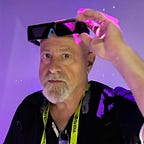An Open Letter To Magic Leap
Dear Rony Abovitz and the Magic Leap (ML)* Team. First, I’d like to express my tremendous admiration for what you’ve accomplished in the sweltering, reclaimed swampland of South Florida in only four years: a new optical system, new operating system, a custom chipset and a robust developer ecosystem. Pulling that off for even 2.4BN seems remarkable, given the time and money Microsoft, Apple, Amazon, Facebook, Snapchat, and Google have spent solving similar problems, often through expensive acquisitions.
Second, I speak for everyone in the industry when I express gratitude for your efforts to popularize the idea of wearable augmented reality (AR). It is hard to explain without showing the magic of AR, and you have been relentless in your efforts.
But it is very hard to make judgments about a device like the ML1 without using it. I hate reporting on reporting. I have not been among the chosen few invited to do one of the coveted demos in Florida. My frequent entreaties have been met with a flurry of vague, useless press releases, which has left me and my colleagues in the press feeling unloved, disrespected and generally cynical about the company. Astonishingly, a company executive recently wondered out loud about the lack of press enthusiasm. After four years of teasing, you should not be surprised. It doesn’t engender warm feelings toward Magic Leap. And it sends writers like me snooping around places like Glassdoor for the real story.
Finally, the reactions of those lucky few who have tried it are mixed, but even if the company’s claims are half true, it’s going to be amazing, and I can’t wait to try it when released to the public later this year.
The partnerships you’ve announced with Lucasfilm, the NBA, WETA, and Madefire suggest ML has placed a strong emphasis on games and entertainment. If true, it’s a mistake.
Were I you, I’d be spending a lot more time with Amazon (digital assistants, computer vision) and Linkedin (utility) than game developers. Digital assistants from Amazon and Google dominated CES. This is happening. A myriad of new applications for these audio based assistants are hitting the market. They have momentum, as does handheld mobile AR, because they make what we are already doing with our smartphones better, faster and cheaper. These are your competitors, not Xbox and PlayStation. Bose demonstrated its approach to sound and audio assistant at SXSW and it was brilliant. Google is one of your largest investors so it would be logical that its digital assistant be integrated into your system.
Imagine you’re at a conference (easy for me, I seem to spend half my time at these). What if, through computer vision, my wearable computer, using facial recognition and geolocation, detected people in my social graph. Would I want their linked in profile to show up in my field of view, or do you think I would prefer a tiny icon to mark them while Alexa whispers their name in my ear? As J0hn Fan of Kopin has been saying, for AR to be truly useful, less is more. The emphasis should be on what is useful, timely, and contextual, without cluttering our view of reality.
Computer vision, world-scale persistence and cloud solutions will soon connect wearables with a world of useful, topical, and invisible data. As a result, the world is about to be painted with data. Every building, street corner, person and object will be painted with data detectable by geolocation and computer vision, including facial recognition. Useful data. Contextual data. The camera and the Universal Visual Browser it enables are the most valuable and useful aspects of the coming wearable, mobile computing revolution you started. Yet we’re oddly not hearing much about that. Were I you, I’d be hanging out with YouAR, 6D.ai, Selerio, Ubiquity6, and the many startups backed by your investors, who are going to make AR truly useful. This is not a game.
Were I you, I would be putting utility and sound first, and games second.
Keep at it, invite us to demo your Magic Leap, and make it truly useful. Please. Make it, like the smartphone, something we can’t live without. Because I can live without every single application you’ve announced thus far.
If you’ve read this, thank you for listening. If you haven’t. Well. I’ll keep my eye on Glassdoor for the real-ish story.
*For those who have not been following the extraordinary development of Augmented Reality, Magic Leap is a secretive startup based in Ft. Lauderdale, Florida. On December 20, 2017, Magic Leap finally gave the world its first look at their augmented reality glasses, called the Magic Leap One: Creator Edition (ML1), which it expects to release sometime in 2018. Brian Crecente of Rolling Stone went to the secretive company’s Florida headquarters for an exclusive first look. The photos ML concurrently released reveal a sort of steampunk HoloLens attached to a palm-sized CPU, or what the company calls its “Lightpack”. Crecente reports the ML1 has a somewhat wider field of view than the 30% of the HoloLens, but it is still not big enough to wow the average consumer. But, per John Fan’s Five Rules for Doing AR right, maybe doesn’t have to be.
Abovitz told Rolling Stone that ML is going for the HoloLens audience: developers, prosumers, and agencies able to pay a premium price for a computer they will mostly have to program themselves. “I would say we are more of a premium computing system. We are more of a premium artisanal computer,” Abovitz told Crecente.
Premium artisanal computer? Oy. Because that’s worked so well for… who? As my old boss, the brilliant Ted Leonsis (now owner of the Washington Capitals and Wizards) used to frequently remind me: “Do you want to win, or do you want to be right?”
This post was originally featured on Forbes.com on April 11, 2018
